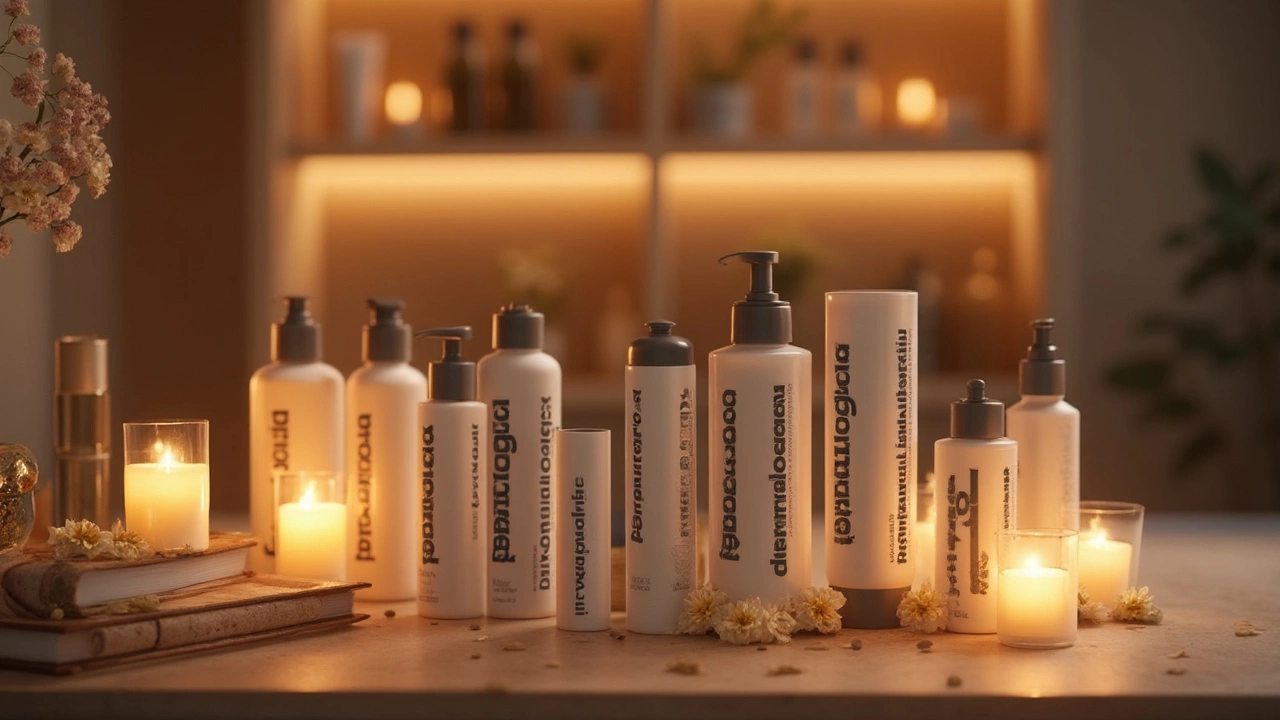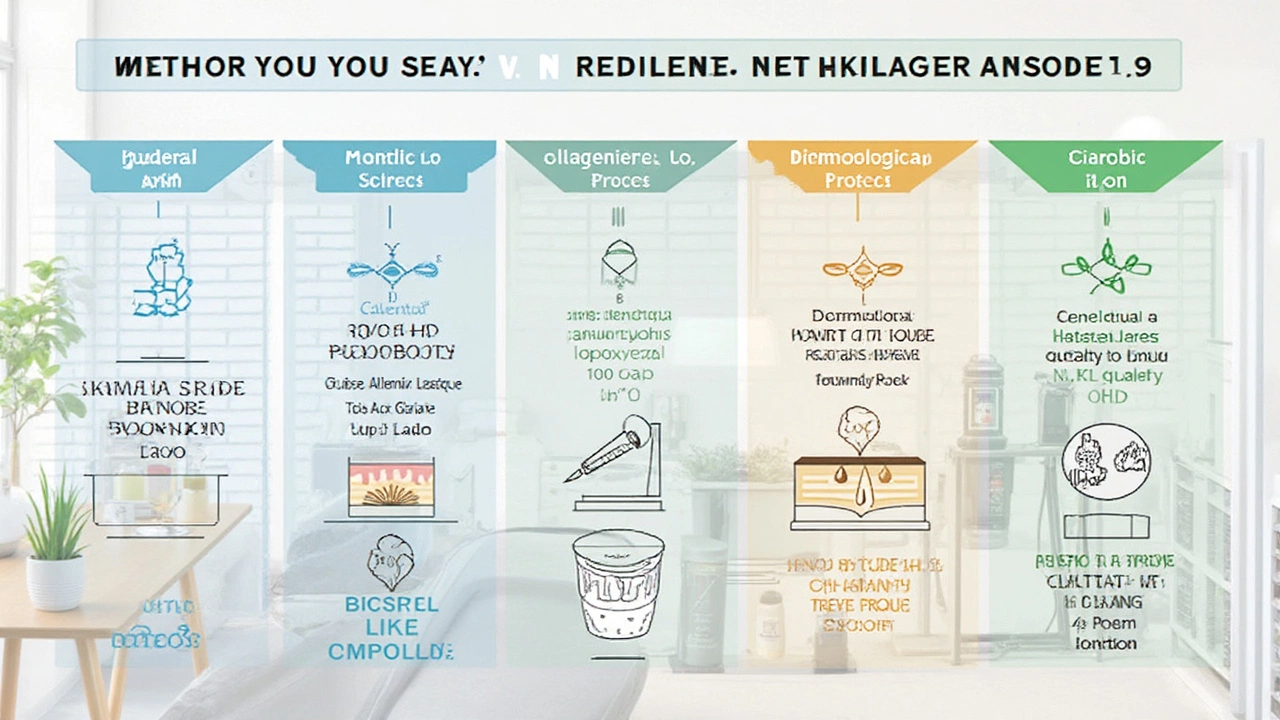
So, you've probably heard the term 'medical grade skincare' tossed around like your favorite moisturizer, right? It's a buzzword in the skincare world, but what does it actually mean, and does Dermalogica fit the bill? Let's break it down. Medical grade skincare refers to products that are usually backed by scientific research and are often sold through dermatologists or licensed skin care professionals. They're typically formulated with a higher concentration of active ingredients compared to over-the-counter products. But the catch? They often come with a heftier price tag.
Now, where does Dermalogica fall in all of this? Known for its science-driven approach, Dermalogica has made a name for itself in both professional and consumer circles. But is it truly medical grade? While it's not classified as such by everyone in the industry, many of its products boast formulations that tread pretty close to that line. They're respected for their focus on skin health rather than beauty gimmicks.
- Understanding 'Medical Grade' in Skincare
- The Science Behind Dermalogica
- Dermalogica vs. Other Brands
- Choosing the Right Skincare for You
Understanding 'Medical Grade' in Skincare
Let’s face it, the term 'medical grade' skincare can sound a bit intimidating. But it’s really just about the quality and concentration of ingredients. These products are usually designed to get beneath the skin's surface, targeting issues like acne, wrinkles, and pigmentation at their root.
Medical grade skincare often differs from regular stuff because it’s tested with the kind of scrutiny you'd expect from medicines. Formulations are often supported by clinical trials. It’s like skincare on steroids, in a good way. Medical grade skincare's higher concentration of active ingredients can make a big difference in effectiveness. But they aren’t for everyone and might suit those with serious skin concerns better. Ever walked into a dermatologist's office and wondered why you couldn’t find that miracle potion at your local pharmacy? That’s the magic of medical-grade.
Think of it as skincare that doesn't just look good on the bathroom shelf but makes real changes to your skin. Brands that fall under this category often need to be dispensed by professionals. They’re a bit high-maintenance but for a good reason — you don’t want to mess around with these powerful ingredients without some professional guidance.
Here’s a little nugget you might find interesting: While 'medical grade' isn’t officially defined by a governing body, some folks say anything sold through a physician meets the criteria. That means the line between medical-grade and professional-grade can sometimes blur, and it's all about finding what works best for you.
The Science Behind Dermalogica
Alright, let’s roll up our sleeves and see what makes Dermalogica tick from a scientific standpoint. Founded by Jane Wurwand in 1986, the brand quickly became a hit for those serious about skin health. It wasn't just about looking pretty—Dermalogica focused on creating healthy skin founded on solid science. But how do they do this?
Dermalogica products are developed by The International Dermal Institute, which conducts research and develops professional-grade solutions that are effective and safe. The formulations often include a mix of key ingredients like peptides to boost collagen, vitamin C for an antioxidant kick, and salicylic acid to keep breakouts at bay. Basically, they target skin issues right at the cellular level. And while a lot of brands promise this, Dermalogica ensures their solutions are backed by actual skin science.
And speaking of ingredients, Dermalogica avoids common irritants like lanolin, SD alcohol, mineral oil, and artificial colors and fragrances. This is a big win for folks with sensitive skin, as all these extras can often cause more harm than good. They also focus heavily on maintaining the skin’s natural moisture barrier and balancing pH levels, which are crucial for any effective skincare routine.
Curious how they stack up in the world of skin research? According to their records, Dermalogica invests heavily in education and research to continue finding new ways to tackle common skin concerns. They’re committed to continual improvement, evidenced by their involvement in various skin health initiatives and partnerships with scientific communities.
Here’s a quirky fact: Did you know that Dermalogica’s professional treatments are estimated to be offered in over 100,000 salons and skin centers across more than 80 countries? This global presence shows how much trust they've built among professionals in the skincare industry.
In a nutshell, the heart of Dermalogica does beat with strong scientific backing. While it might not always be labeled as medical grade skincare, it's clear they pump out products with a serious understanding of skin anatomy and the science behind it. If you’re looking for something that balances nature and science seamlessly, this might just be the key to a happy skin routine.

Dermalogica vs. Other Brands
When you think about professional skincare, Dermalogica probably pops up alongside other brands like Neutrogena, SkinCeuticals, or La Roche-Posay. So, how does it stack up? It's all about philosophy and formulation.
Unlike some other brands, Dermalogica focuses heavily on education and customization. They don't just say "buy our product;" they aim to teach you about your skin. It's like having a skincare lesson with every purchase. This brand avoids common irritants like alcohol and artificial colors—stuff that often sneaks into skincare products without us noticing.
Meanwhile, brands like SkinCeuticals are known for their high potency serums and antioxidants. They're considered by many as truly medical grade, primarily because their products are often studied and recommended by dermatologists.
On the other hand, Neutrogena and La Roche-Posay offer more accessible price points, which is fantastic if you're experimenting or on a budget but might lack some of the advanced formulations that Dermalogica prides itself on.
Dermalogica, however, stands out in its commitment to professional-grade results without a doctor's visit. They lean on their line of results-driven facials and peels, available through authorized skin therapists.
- Dermalogica: Emphasizes skin health, no artificial fragrances, available through skincare professionals.
- SkinCeuticals: High-potency clinical skincare, often dermatologist-recommended.
- Neutrogena: Known for affordability, widely accessible, but with a basic focus.
- La Roche-Posay: Focuses on sensitive skin, developed with dermatologists.
Ultimately, the right choice depends on your skin needs and wallet. If you're looking for professional results and educational support, Dermalogica might just be your go-to!
Choosing the Right Skincare for You
When it comes to picking the perfect skincare routine, there's a lot to think about. Diving into the shelves of products, whether you're browsing online or in a store, can feel overwhelming. How do you even start figuring out if something like Dermalogica is the right pick for your skin? Here are some tips to guide you through this skincare maze.
First, understand your skin type. Is it oily, dry, combination, or sensitive? Knowing this basic info is the foundation of selecting choices that work. For example, if you have sensitive skin, you'll want to avoid products with harsh chemicals or heavy fragrances.
- Oily Skin: Look for lightweight, non-comedogenic products that control oil and prevent breakouts.
- Dry Skin: Seek moisturizing ingredients like hyaluronic acid and ceramides to keep your skin hydrated and plump.
- Combination Skin: A balance of light and moisturizing products is the way to go.
- Sensitive Skin: Stick to gentle formulas without synthetic fragrances or dyes.
Next up, consider your specific skin concerns. Are you battling acne, signs of aging, or maybe even hyperpigmentation? This helps narrow down the active ingredients you'll want. For example, retinol is great for anti-aging, while salicylic acid works wonders on acne.
To make it easy, here's a little quick guide:
| Concern | Recommended Ingredients |
|---|---|
| Acne | Salicylic Acid, Benzoyl Peroxide |
| Aging | Retinol, Vitamin C |
| Hyperpigmentation | Niacinamide, Vitamin C |
And lastly, consider the brand's philosophy and commitment to skin health. A brand like Dermalogica focuses on professional-grade ingredients and is known for maintaining the skin's health rather than just appealing to current beauty trends. Plus, they often offer personalized consultations to help tailor products to your skin's needs.
So there you go! With your skin type and concerns in mind, you can confidently reach for products that are not only effective but also truly beneficial. Remember, it’s not just about following trends but finding what genuinely works for you.